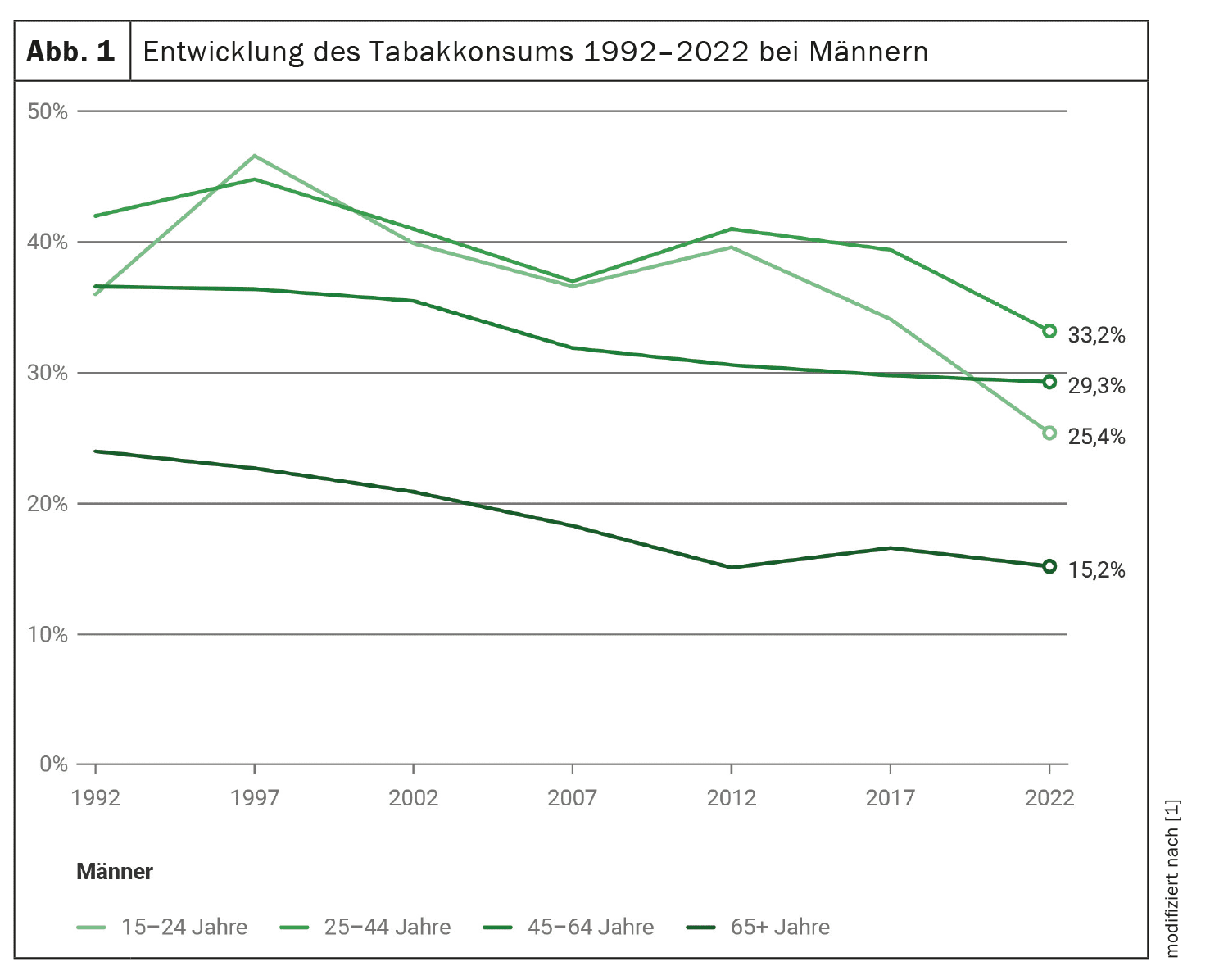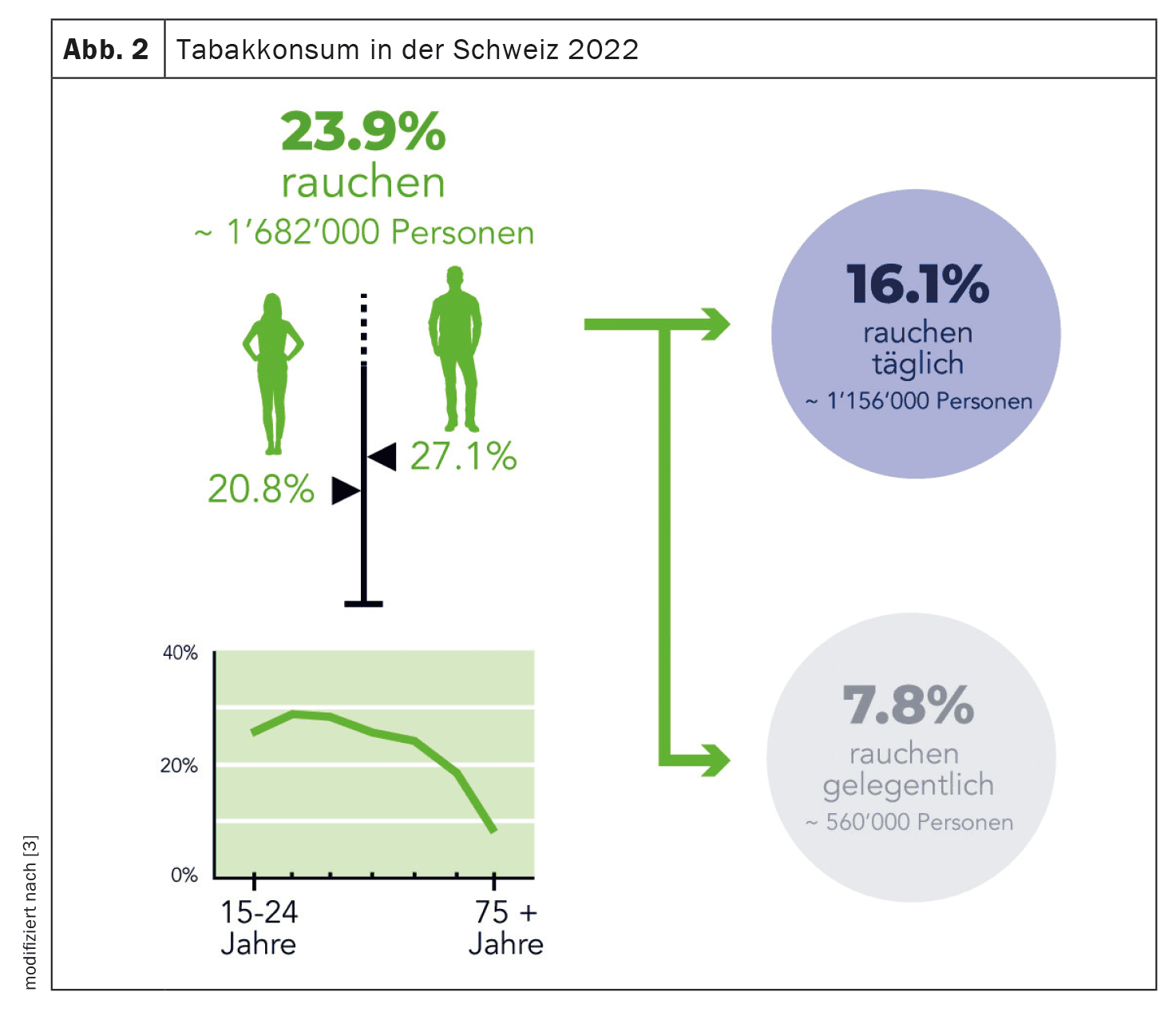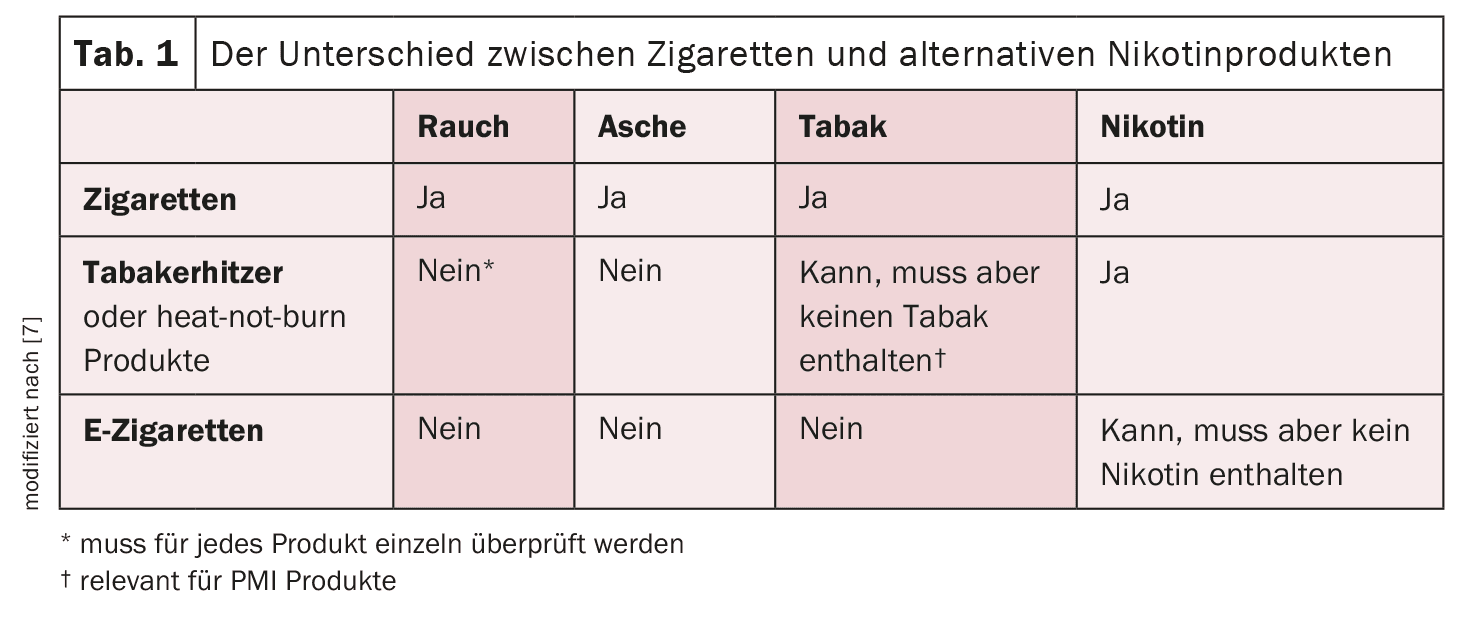The health risks of smoking are now well known. Many efforts have been and are being made, not only by scientists but also by politicians, to minimize the risks. Alternatives to conventional cigarettes are intended to help reduce harm. But they usually also contain nicotine. Isn’t there a contradiction? A search for traces…
At the beginning of the 1990s, cigarette consumption was booming (Fig. 1) [1]. At that time, smoking was almost commonplace and was tolerated not only in private settings but also in public buildings. This changed in the new millennium in the course of various smoking cessation campaigns. The effects on tobacco consumption were noticeable. In fact, the proportion of people who smoke has now fallen. At least among men – this has fallen from 37% to 27%, whereas it has remained stable among women [2]. Around 25% of the population in Switzerland currently smoke (Fig. 2) [3]. In 2023, around nine billion cigarettes were consumed [4]. Some of them also use alternative nicotine products. E-cigarettes and the like are also popular for smoking cessation. In fact, a Cochrane Review has now shown that e-cigarettes increase cessation rates compared to nicotine replacement therapy [5]. However, this finding has not yet reached the general public: According to a survey on the health risks of e-cigarettes compared to normal tobacco cigarettes, around half of the respondents thought that the health damage of the two smoking products was the same [4]. In Switzerland, around 9500 people still die every year as a result of tobacco consumption [6]. Time to minimize the greatest avoidable health risk.
The danger of burning tobacco
So what are the differences between conventional cigarettes and alternative nicotine products? In conventional cigarettes, the tobacco is burnt, resulting in temperatures of over 400°C – often reaching 800°C and more at the peak. The resulting smoke is a mixture of thousands of chemicals and billions of solid and liquid particles. In this complex mixture, around 100 chemicals have been linked to smoking-related diseases by health authorities. The theory behind alternative nicotine products is that less harmful chemicals are produced if the tobacco is not burnt but simply heated. In this way, no smoke is produced, but an aerosol containing nicotine, commonly referred to as “vapor” (Table 1) [7]. With these heat-not-burn products or heated tobacco products (HTP) and e-cigarettes, emissions are reduced by around 90-95% on average.
Nicotine in alternative smoking products
Nicotine is a naturally occurring organic substance that belongs to the alkaloid group. It is produced by plants from the Solanaceae (nightshade) family, with the tobacco plant having the highest nicotine content. The plant itself probably uses nicotine as a defense mechanism against insects and pathogens. Humans, on the other hand, use it for its stimulating effect. Nicotine binds to nicotinic acetylcholine receptors, which leads to a number of transient reactions in the body, such as increased heart rate and blood pressure. It also triggers the release of neurotransmitters that are said to increase energy levels and can lead to feelings of pleasure, relaxation and alertness. As a result, nicotine can stimulate and ultimately affect short-term brain functions such as emotions, learning and memory. However, prolonged use of nicotine over an extended period of time can lead to changes in the brain’s reward and stress systems, making withdrawal symptoms more likely. These symptoms are not permanent and reversible once a person successfully quits and abstains from the use of tobacco and nicotine-containing products. However, it is precisely these withdrawal symptoms that make it so difficult to stop smoking. Many smokers also state that they smoke for the perceived benefits, including enjoyment, stress relief and relaxation. In addition, some studies report that nicotine can enhance cognitive processes such as improving attention, memory and fine motor skills.
Cigarettes, cigars and other products that burn tobacco are designed to emit inhalable nicotine-containing smoke. As the name suggests, alternative nicotine products also contain nicotine, but usually in much smaller quantities. This is because nicotine can be an important factor in encouraging adult smokers who would otherwise continue to smoke to switch completely from cigarettes to smokeless products and, by extension, to quit smoking altogether. The Commissioner of the US Food and Drug Administration (FDA) and Director of the FDA Center for Tobacco Products also stated in 2017 that while nicotine cannot be presented as completely harmless, it is not directly responsible for the cancer, lung and heart disease caused by tobacco. It goes without saying that the best way for smokers to reduce the risks of smoking is to give up tobacco and nicotine altogether. However, if you don’t want to quit or keep falling off the wagon, you are well advised to switch to a product that doesn’t burn tobacco.
Literature:
- www.at-schweiz.ch/de/wissen/daten-zahlen/tabakkonsum-unter-jugendlichen/entwicklung (last accessed on 16.11.2024).
- www.bfs.admin.ch/bfs/de/home/statistiken/gesundheit/determinanten/tabak.html (last accessed on 16.11.2024).
- www.suchtschweiz.ch/zahlen-und-fakten/zigaretten-co/zigaretten-co-konsum (last accessed on 16.11.2024).
- https://de.statista.com/themen/4003/zigarettenkonsum-in-der-schweiz/#topicOverview (last accessed on 16.11.2024)
- Sun R: Cigarette smoking relapse among recent former smokers who switched to e-cigarettes or other tobacco products. The E-Cigarette Summit, 14.05.2024, Georgetown, USA.
- www.watson.ch/leben/wissen/857680569-weltnichtrauchertag-so-raucht-die-schweiz-im-weltweiten-vergleich (last accessed on 16.11.2024).
- www.pmiscience.com/en/smoke-free/harm-reduction/difference-between-heated-tobacco-iqos-cigarettes-vape (last accessed on 16.11.2024).
CARDIOVASC 2024; 23(4): 26–27
HAUSARZT PRAXIS 2024; 19(12): 32–33














